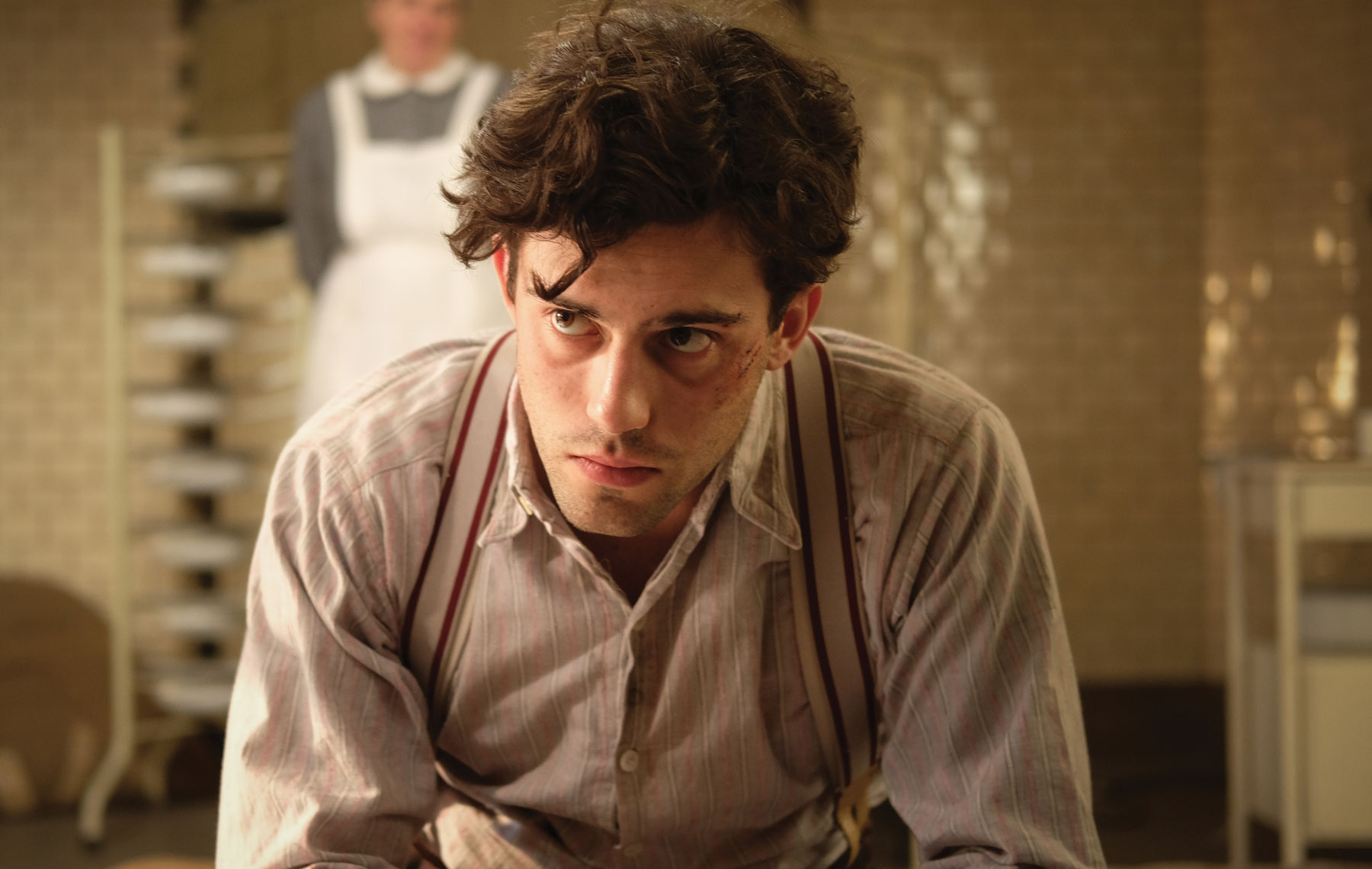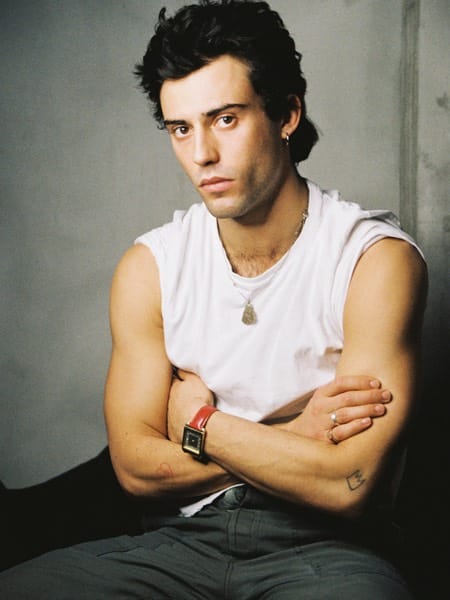 Aaron Altaras as Eugen Friede in “The Invisibles.” Photo courtesy of Greenwich Entertainment
Aaron Altaras as Eugen Friede in “The Invisibles.” Photo courtesy of Greenwich Entertainment
“I can’t believe you’re interviewing Aaron Altaras,” a Tel Aviv friend of mine said. “He’s so hot.”
Normally, I’d dismiss this as one of her usual “movie star” crushes (Henry Cavill being No. 1), except two other Israeli friends couldn’t believe it, either. You’d think Atlaras were Brad Pitt (from back in the day), the way they were gushing over the co-star of the Netflix sensation “Unorthodox.” For them, he has special allure: Altaras is Jewish. (Spoiler: But not necessarily more available. The 24-year-old has a girlfriend.)
Meeting him was a walk in the park, literally. No cafes were open, so we opted for the popular Gleisdreieck park in the hip neighborhood of Kreuzberg during the sunny denouement of Berlin’s coronavirus lockdown. His vintage jacket from a thrift shop went well with his heartthrob-y smolder and swagger.
We had been in touch in September 2017, when his proud father, composer Wolfgang Böhmer, suggested I interview Altaras about the film “The Invisibles,” in which Altaras plays a “U-boat,” the term for Jews hiding underground during Nazi Berlin. At the time, Böhmer (who was raised Catholic) was promoting his Holocaust-themed production, the musical “Stella: The Blonde Poison of Kurfurstendamm” about the infamous Jewess, Stella Goldschlag, who under duress collaborated with the Nazis to “catch” the U-boats. Atlaras’ mother, writer-director-actress Adriana Altaras, also deals with Holocaust themes as a second-generation Holocaust survivor.
Now, in the streets of Berlin, should Altaras be “chased,” it would be for his good looks and onscreen charisma — not that he’s concerned anyone would approach him for a selfie. Berlin doesn’t have American celebrity-paparazzi culture. And there’s social distancing.
At my request, he gave me a peek at his never-ending Instagram message feed. “You’re so beautiful” and “You were great in ‘Unorthodox,’ ” read the more PG-rated fan mail from men and women. He’s already the subject of a spontaneous, international fan club among the gay community, in the wake of his role as a gay soccer player in the German film “Mario.”
“ ‘Unorthodox’ was a whole different level because the reach of Netflix is obviously mind-blowing, but then within that, a couple of things came together,” Altaras said as we walked along the park’s pathways. “The first thing was, obviously, that it was during the peak or the beginning of corona[virus] lockdowns, which is obviously a tragic thing. But the upside of it was that it probably helped our series to get a lot more attention because people are at home and they need to be entertained or moved. We were very, very surprised at how well the series did.”

“Unorthodox” became one of the top 10 most-watched series on Netflix in Germany and other countries. Altaras plays Robert, the happy-go-lucky (and non-Jewish) romantic interest of the heroine, Esty (played by Israeli actress Shira Haas). Esty’s journey to Berlin out of the Satmar ultra-Orthodox sect in Williamsburg, N.Y., was inspired by Deborah Feldman’s memoir.
While Atlaras knew little about the Williamsburg sect before filming, he is well versed in Judaism.
Apparently, it’s a small Jewish film world. The director-writer of “The Invisibles,” Claus Räfle, happened to be walking ahead of us.
The lockdown gave Räfle the opportunity to watch “Unorthodox” and the Israeli drama series about ultra-Orthodox Jerusalem life, “Shtisel.” He wonders why public German television stations wouldn’t collaborate on such productions because they could combat Jewish stereotypes and anti-Semitism by humanizing these mysterious Jews.
“It showed us how they live their daily life, especially the series ‘Shtisel,’ ” said Räfle, who is not Jewish. “They run around with curly ‘things’ and they look different and we think, ‘What a world!’ But no one knows anything about it. But when you are in touch with it, you start to like it.”
“Unorthodox,” on the other hand, received some criticism for portraying characters in the Satmar community with clichéd, even subtly anti-Semitic strokes, despite the writers being Jewish. Alan Posener, a prominent columnist for Die Welt, a national German daily newspaper, remarked on the difference between “Unorthodox” and “Shtisel”: “Must it be that the uncle with whom Esty lives is a tenant shark who makes life difficult for a financially strapped piano teacher? That her cousin, who is sent to Berlin to bring her back, carries a pistol with him and associates with a Jewish brothel and casino operator?” Posener described the series as a “feel good” movie for Berlin hipsters who pride themselves on being (superficially) liberated and enlightened.
Altaras thinks the series’ focus — and inspiration — is the coming-of-age theme. “It’s about a woman’s journey, who says, ‘I don’t want to live like this, and I’m going somewhere else,’ ” he said, adding he admires the guts of fictional Esty, Feldman and Haas. It’s also why Robert and Esty’s romantic relationship in the film is undefined: She gets to decide.
While Atlaras knew little about the Williamsburg sect before filming, he is well versed in Judaism. He attended Berlin’s community Jewish elementary and high school, and studied liberal arts in Amsterdam before realizing acting was his calling. He’s concerned about rising right-wing anti-Semitism and xenophobia in Germany (which he thinks possibly can bond Muslims and Jews), although he doesn’t feel it on a day-to-day basis, perhaps because people might not know he was Jewish (unless they Googled him).
Blame it on his multi-ethnic looks and theatrical versatility, Altaras is not pigeonholed into Jewish roles — to his delight. He was bummed the shooting of his next series in which he plays a Turkish German boxer was interrupted by the coronavirus — as was his Passover trip to Israel. He would have loved to hang with the cast of “Unorthodox,” and maybe some new fans.
Could “Unorthodox” be a springboard into Hollywood? Atlaras has his sights set on Hollywood’s indie scene. Netflix has changed the Hollywood game. “Everything’s shot in the original language. If something’s set in Mexico, the actors will be Mexican and they’ll be speaking Spanish. And it’s the same with our series. It’s a hard sell; we’re going to do a series that will be 50% in Yiddish. Try to sell that to a big production company? … Netflix just pulls that off.”
Going through his Instagram feed, he rattles off invitations from Cape Town, Buenos Aires — and, of course, Tel Aviv. But they — and Hollywood — will have to wait.
“I can’t go anywhere right now,” he said.
Orit Arfa is a journalist and author based in Berlin. Her second novel is “Underskin.”























 More news and opinions than at a Shabbat dinner, right in your inbox.
More news and opinions than at a Shabbat dinner, right in your inbox.